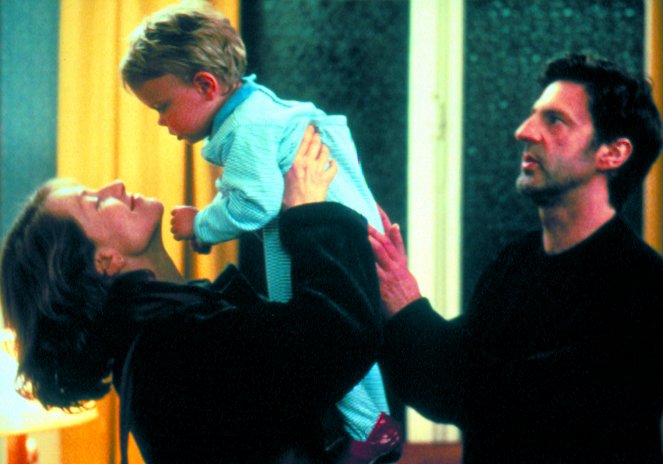Ohjaus:
Christian VincentNäyttelijät:
Isabelle Huppert, Daniel Auteuil, Karin Viard, Jérôme Deschamps, Jean-Jacques Vanier, Nina Morato, Laurence Lerel, Frédéric Gélard (lisää)Juonikuvaukset(1)
Pierre and Anne have been living together for several years and have a young son. Then, one day, Pierre senses a sudden coldness in their relationship. Gradually, things deteriorate and Anne finally admits that she is seeing another man... Starring two of France's most accomplished actors, Isabelle Huppert and Daniel Auteuil, LA SEPARATION charts the tragic disintegration of a relationship. Anne and Pierre have been together for several years and have a young son. One night, Anne announces that she is in love with someone else. Surprisingly, Pierre is not angry and he avoids asking her the questions that are obviously burning inside him. A rift opens up between them. Pierre outwardly appears to accept her affair, but as they attemt to carry on as normal, tensions begin to build. Soon Pierre is unable to hide his now violent emotions. (Cinemax)
(lisää)Arvostelut (2)
With this one, it’s pretty hard to accept and understand all the feelings that the director Christian Vincent wanted to squeeze into Isabella and Daniel. If I looked at it from the perspective of a man, I understood Daniel for a while and then for a while I had no idea what was going on. Being a man, I couldn’t understand Isabella at all, since it is (almost) impossible for a man to understand a woman. And the other way around. The acting performances were as good as befits a French movie.
()
“I'm not going anywhere.” I don’t know whether the French like talking about themselves and their relationships so much or only enjoy making films about it, but thanks to many years of experience, they are definitely able to aptly express complicated life situations. There is rarely a wordless moment in the Pialat-esque, raw relationship drama La Séparation. However, the scenes that remain in your memory the longest are those in which the characters communicate with each other through gestures and looks, as well as by touching and, conversely, not touching each other. Pierre and Anne themselves have trouble finding words for their feelings. Neither of them was prepared for something like this and neither knows how to continue. The topic of the film is not actually separation itself, but the effort to comprehend and name it, the effort to somehow “communicate” it. Besides talking to a friend, a professor of philosophy, Pierre is helped by making a video diary in which he can say what Anne cannot. Despite that, the feelings that prevail on the face of Daniel Auteuil, who is more and more reminiscent of Al Pacino in Carlito’s Way as he wanders the streets at night, are confusion, insecurity and fear of losing a pillar of his life. Written by a pair of screenwriters, the film understandably gives precedence to the male perspective, but Pierre is essentially favoured only due to the fact that we spend more time with him than with Anne, who is a bit too cold (which may in part be due to Isabelle Huppert’s reserved acting). At critical moments, however, she behaves more hysterically than a woman and does not elicit much sympathy. La Séparation is an unpleasantly painful film at times due to the characters’ unwillingness to in any way lighten the situation and come to a satisfactory resolution. Its authenticity is aided by the avoidance of most of the clichés found in similar films – for example, the woman, not the man, finds a new partner; instead of quarrels, the couple try to resolve the crisis through rational conversation; the relationship with the young and attractive nanny does not develop as expected. With a runtime of just under ninety minutes, La Séparation is a very economical film that, despite the large number of words, says relatively little yet, at the same time, says everything it needs to say. Long dialogue scenes end in fade-outs, which emphasise the inevitability of the end and leave room for our speculation as to what happened in the meantime. Facts not directly related to the relationship (such as employment) are reduced to a minimum, thanks to which the film does not run off in every possible direction and is thus very concentrated and lends itself to repeated viewing and searching for more words that remain unspoken. If you don’t want to pour salt into an open wound, don’t watch La Séparation during or shortly after your own breakup, but don’t hesitate to add it to your list of the best breakup movies. 75%
()


Mainos